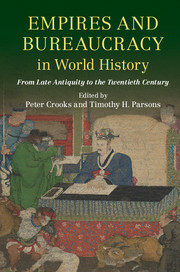Book contents
- Frontmatter
- Contents
- List of Figures
- List of Maps
- List of Tables
- List of Contributors
- Preface
- List of Abbreviations
- Part I Introduction
- Part II Empires and Bureaucracy in World-Historical Perspective
- Part III From Late Antiquity to the Middle Ages
- Part IV From the Age of European Expansion to the End of Empires
- 12 Magistrates to Administrators, Composite Monarchy to Fiscal-Military Empire: Empire and Bureaucracy in the Spanish Monarchy, c.1492–1825
- 13 Britain's Overseas Empire before 1780: Overwhelmingly Successful and Bureaucratically Challenged
- 14 ‘Les Enfants du Siècle’: An Empire of Young Professionals and the Creation of a Bureaucratic, Imperial Ethos in Napoleonic Europe
- 15 Bureaucracy, Power and Violence in Colonial India: The Role of Indian Subalterns
- 16 From Chief to Technocrat: Labour and Colonial Authority in Post–World War II Africa
- 17 The Unintended Consequences of Bureaucratic ‘Modernization’ in Post–World War II British Africa
- Part V Afterword
- Index
15 - Bureaucracy, Power and Violence in Colonial India: The Role of Indian Subalterns
from Part IV - From the Age of European Expansion to the End of Empires
Published online by Cambridge University Press: 05 August 2016
- Frontmatter
- Contents
- List of Figures
- List of Maps
- List of Tables
- List of Contributors
- Preface
- List of Abbreviations
- Part I Introduction
- Part II Empires and Bureaucracy in World-Historical Perspective
- Part III From Late Antiquity to the Middle Ages
- Part IV From the Age of European Expansion to the End of Empires
- 12 Magistrates to Administrators, Composite Monarchy to Fiscal-Military Empire: Empire and Bureaucracy in the Spanish Monarchy, c.1492–1825
- 13 Britain's Overseas Empire before 1780: Overwhelmingly Successful and Bureaucratically Challenged
- 14 ‘Les Enfants du Siècle’: An Empire of Young Professionals and the Creation of a Bureaucratic, Imperial Ethos in Napoleonic Europe
- 15 Bureaucracy, Power and Violence in Colonial India: The Role of Indian Subalterns
- 16 From Chief to Technocrat: Labour and Colonial Authority in Post–World War II Africa
- 17 The Unintended Consequences of Bureaucratic ‘Modernization’ in Post–World War II British Africa
- Part V Afterword
- Index
Summary
The study of bureaucracy in a colonial context such as India is a rather unfashionable subject, evocative of images of privileged white men struggling to uphold their moral authority and maintain a gendered, racialized and coercive form of power. Until fairly recently, however, it provoked a notably different image thanks to the romantic mythology surrounding the Indian Civil Service (ICS), which from the late 1850s was the ‘steel frame’ of the British Indian empire. According to this myth, there was ‘no Service like it in the world’ since, as viceroy Lord Dufferin (1826–1902) enthused, ‘for ingenuity, courage, right judgment, disinterested devotion to duty, endurance, open-heartedness, and at the same time, loyalty to one another and their chiefs [the ICS officer was] superior to any other class of Englishman’. Dufferin's statement is oddly lacking in any reference to India, Indians, or the actual effectiveness of the ICS. Nonetheless, this myth served to justify British rule in India, and it grew in stature from the early twentieth century as that rule became increasingly threatened. It also served to shore up the claims of other empire builders. For Theodore Roosevelt, India offered ‘the most colossal example history affords of the successful administration by men of European blood of a thickly populated region in another continent’, which for him was not only ‘a greater feat than was performed under the Roman Empire’ but ‘one of the most notable and most admirable achievements of the white race during the past two centuries’.
Such a myth – which served to foster an image of ‘a benign, paternalistic Raj governing a quiescent society through the “rule of law” ’, and through collaboration with indigenous elites rather than coercion – was perpetuated by much of the literature published on bureaucracy in colonial India up to the 1970s, particularly works by former ICS officials such as L. S. S. O'Malley and Philip Mason. The myth has, therefore, served the function (as a later historian of the ICS has termed it) of ‘white washing the British bureaucracy’.
- Type
- Chapter
- Information
- Empires and Bureaucracy in World HistoryFrom Late Antiquity to the Twentieth Century, pp. 364 - 390Publisher: Cambridge University PressPrint publication year: 2016



